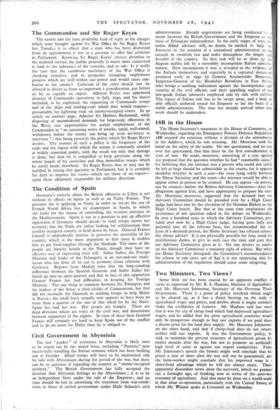The Condition of Spain
Germany's concern about the British offensive in Libya is not without its effects on Spain as well as on Vichy France. The pressure she is applying to Vichy in order to secure the use of French North Africa has its counterpart in Spain, to which she looks for the means of controlling the western entrance to the Mediterranean. Spain is not in a position to put up effective opposition if Germany should decide to send troops across her territory, but the Nazis are rather looking for collaboration than another occupied country to hold down by force. General Franco himself is undoubtedly anxious to preserve the neutrality of his country, which is the more important to him since it enables him to get food-supplies through the blockade. The mass of the people are bitterly hostile to the Nazis, though they have no effective way of expressing their will. Sefior Sufier, the Foreign Minister and leader of the Falangists, is an out-and-out totali- tarian who has done all he can to promote closer relations with Germany. Reports from Madrid_ state that the long-standing difference between the Spanish Generals and Selior Stiller has flared up into an open quarrel, and that in face of this opposition General Franco has had difficulties in keeping his Foreign Minister. The one thing in common between the Falangists and the leaders of the Army is their dislike of Communism, but that did not reconcile the Generals to sending troops to help Hitler in Russia ; the small force actually sent appears to have been no more than a quarter of the size of that asked for by the Nazis. Spain has had her war. Her people are hungry. There are deep divisions which are relics of the civil war, and dissensions between supporters of the regime. In view of these facts General Franco will certainly try hard to keep Spain out of the conflict and to do no more for Hitler than he is obliged to.


























 Previous page
Previous page